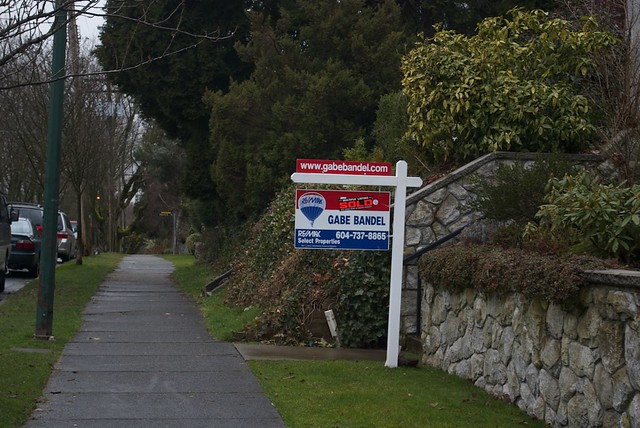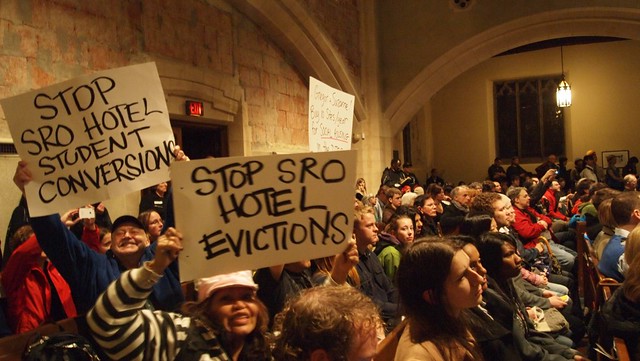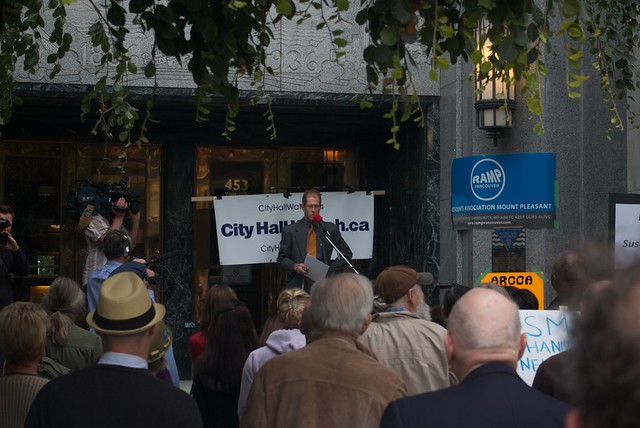Vancouver’s civic election on Saturday has brought us a new City Council. But as the five million dollar campaign fades, we should take a look at what this ‘new’ council wants to do. By electing Gregor Robertson and the Vision slate, voters have decided to stay the course on a path started in 2008 — but what exactly is the course?
Though progressives might feel relieved for keeping out an NPA majority, we must remember that Vision has and will implement neo-liberal policies — many of them NPA policies from the 2005 – 2008 term under Sam Sullivan. Residents will have to mobilize against council, or else get more of the same. Over the past three years we saw the donning of Vancouver as the City with the lowest businesses taxes in the world, matching an increase, not a decrease in homelessness, and an almost 20% increase in housing prices last year alone. These losses can be weighed against the positive implementation of the unjustly controversial backyard chicken coops, bike lanes, and food carts. While we will be safe from the NPA’s street-car, we will most certainly not be safe from Vision’s land-use policy predicated on eviction and demolition of affordable housing.
Because council has the same developer-funded majority it has had over the past two terms, we can look at the past six years to loosely predict what we will see on council over the next three:
a) Wedge issues
To create the illusion of democracy and choice, NPA and Vision will have to chose a set of wedge issues, which will redirect the discussion of civic politics away from issues onto superficial gossip and ruling-class infighting. Differentiation will have to take place in lieu of actual difference. Over the past three years, we’ve seen the two developer parties focus on personal smears, bike lanes, $1,000 environmental projects, or most recently, the street-car. Many progressives stand with Vision on these issues, but they are only a distraction from the municipal government’s main purpose, which is to regulate land-use and facilitate affordability.
b) Gentrification
We will see much more displacement in Vancouver, especially the Downtown Eastside. Vision Vancouver wants to build condos in the Downtown Eastside as part of their ‘ten-year housing plan’. The only way they can do this without subsidizing (which they are against) is to build in low-income neighbourhoods where the land is least expensive. Even when there was only one NPA councillor, Vision Vancouver embraced the NPA’s plan to rezone the DTES for condo towers. Already, Vision is set to approve a proposal for a 17-storey condo tower for the corner of Main and Keefer. The developer is Westbank Corp, which held a huge fundraiser for Vision during the election. The two new NPA councilors will agree with Vision’s plan to increase condo development in this low-income neighborhood, while COPE will have to make their critique of gentrification from the sidelines
We will also see large condo towers popping up throughout East Vancouver, justified as part and parcel of the NPA’s EcoDensity program, which Vision Vancouver has adopted since 2008. Massive developments in low-income neighbourhoods are the most profitable form of real-estate development, and are therefore the most desired by developers. In anticipation of this gentrification, shops will raise their rents and evict long-time businesses. This can already be seen on Main Street, along Kingsway, in the Downtown Eastside, and elsewhere.
c) Evictions
Gregor Robertson and Vision Vancouver have said on several occasions that they are unable to stop evictions. But the truth is that they do not want to stop them, because their housing policy is literally dependent upon evictions. To build affordable housing without subsidizing it, you need to evict low-income tenants — that is the only way. Vancouver has “rate-of-change” bylaws that prevent conversion of rental to condominiums, but do not prevent conversion from low-income rental to medium or high-income rental. Vancouver has created its own portmanteau for this ongoing process: the ‘renoviction.’ This is the simple process of landlords evicting tenants to increase rents further than inflation-plus-2%.




